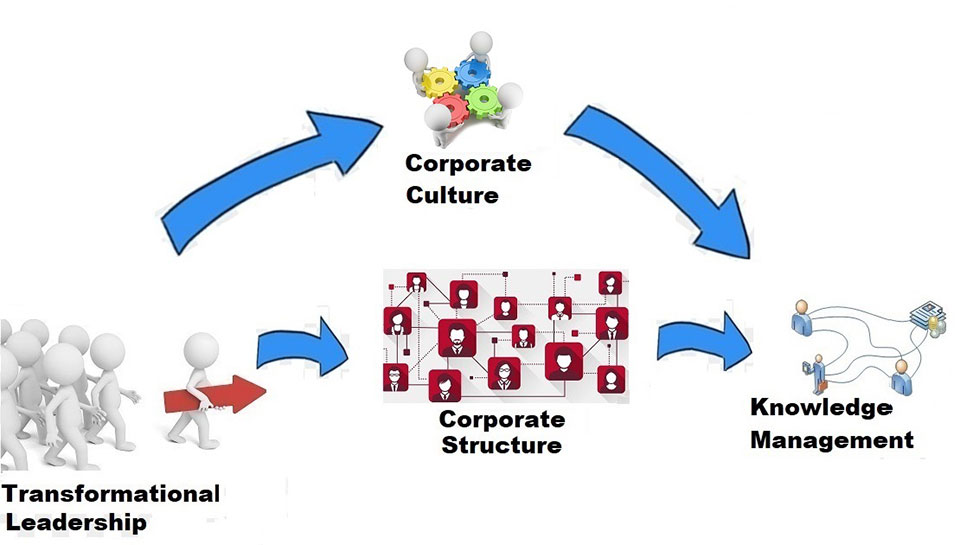A Transformational Leader’s Toolbox to Build a Knowledge-Creating Company

The key to transformational leadership is based upon satisfying basic needs and meeting higher desires though inspiring followers to provide newer solutions and create a better workplace. Transformational leaders actually employ charismatic behaviors and motivate subordinates to provide better outcomes, more profitability, and satisfying careers.
These leaders focus on the critical human assets such as commitment and thus help followers to effectively implement organizational changes with both efficiency and effectiveness. It is this leadership style that sheds light on the strategic role of follower attitudes and values to accomplish a higher degree of effectiveness, and highlights the importance of employees in implementing changes at the organizational level.
Today’s global business environments involve a high level of uncertainty, organizations will increasingly need more transformational leaders to be more innovative and creative.
Corporate culture includes three dimensions: collaboration, trust, and learning. Transformational leaders facilitate collaboration to develop relationships in organizations. A transformational leader contributes to the cultural aspect of trust, through considering both employee’s individual interests and company’s essential needs.
Also, transformational leaders identify individual needs of their employees and develop a learning culture to generate new knowledge and share it with others. Transformational leaders can, therefore, manipulate a firm’s culture (collaboration, trust and learning) to conform to the needs and expectations of strategic goals and objectives.
Corporate structure can be reshaped by transformational leaders when they develop knowledge sharing and inspire employees to create new ideas for a better environment among business-units and departments. Informal structure could facilitate new idea generation to build a more innovative climate within organizations. Transformational leaders are known to implement organizational changes that develop better collaboration among subordinates and managers.
Centralized versus decentralized decision making is a topic that transformational leaders must deal with. Scholars found that more emphasis on formalized and mechanistic structures can negatively impact the transformational leader’s ability to exert such changes. On the contrary, a more decentralized and organic structure may enable transformational leaders to improve departmental and managerial interactions.
The mechanical or centralization at the commanding level of transformation leadership impairs the opportunity to develop relationships among managers, business units, and departments. Thus, transformational leaders are top management executives who enhance decentralized and organic structures to develop relationships and interactions within organizations.
The Impact of Change on Knowledge Management Performance
Corporate culture plays a critical role in exploiting organizational knowledge. Collaboration provides a shared understanding about the current issues and problems among employees, which helps to generate new ideas within organizations. Trust towards their leader’s decisions is a necessary precursor to create new knowledge. Moreover, the amount of time spent learning is positively related with the amount of knowledge gained, shared, and implemented. Therefore, transformational leaders can reshape, and in some cases, manipulate corporate culture to create a more effective knowledge cycle within departmental and business units of organizations.
Corporate structure can be reshaped by transformational leaders to be more effective when the command center of organizations can disseminate information in a decentralized and organic way as opposed to the mechanical and centralized command center. Decentralized structures shift the power of decision-making to the lower levels and subsequently inspire organizational members to create new ideas and even implement them while centralized structures may negatively impact interdepartmental communications and inhibit knowledge exchange.
Ergo, transformational leaders positively contribute to organizational knowledge management through building more decentralized and organic structures within organizations. The following figure provides a snapshot of how transformational leadership, corporate culture and corporate structure are linked.
Written by Mostafa Sayyadi.
Bring the best of the CEOWORLD magazine's global journalism to audiences in the United States and around the world. - Add CEOWORLD magazine to your Google News feed.
Follow CEOWORLD magazine headlines on: Google News, LinkedIn, Twitter, and Facebook.
Copyright 2025 The CEOWORLD magazine. All rights reserved. This material (and any extract from it) must not be copied, redistributed or placed on any website, without CEOWORLD magazine' prior written consent. For media queries, please contact: info@ceoworld.biz








